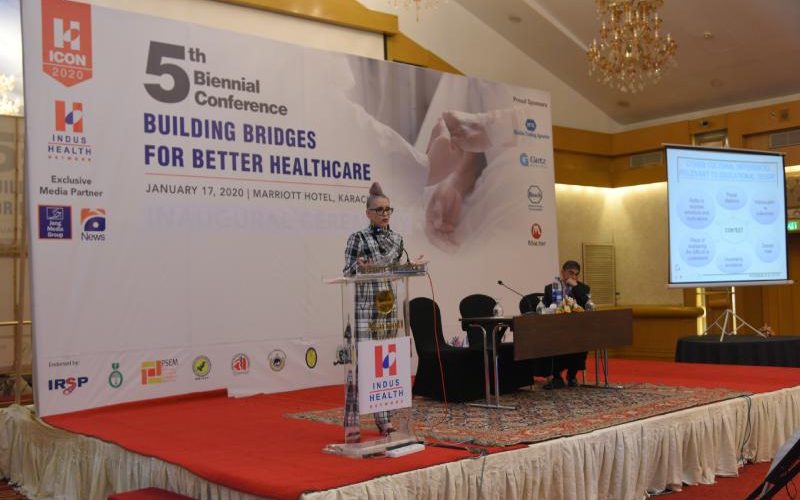
Karachi, Pakistan
January 19, 2020
The Indus Health Network (IHN)’s ICON 2020 ended on January 19, 2020. The biennial conference was fifth of the series. IHN has been conducting it since 2012. ICON 2020 was preceded by overarching plenary lectures, symposia, workshops, and abstract and poster presentations.
The purpose of the conference was to facilitate communication across researchers, academicians, health professionals, and policymakers to promote education, research, and training in health services and to ensure sustainable capacity.
Networking and the sharing of research and good practice has been an integral part of the ICON. The objective of the abstract and poster presentation was to share attendees’ work in an informal yet interesting setting.
The Indus Health Network was honored to receive and host the most prestigious clinicians, researchers, and policy makers from different parts of the world which included: Dr. Sean Kivlehan, Director for International Emergency Medicine at Brigham and Women’s Hospital and Harvard Hospital; Dr. Megan Rybarczyk, Associate Fellowship Director, Global Emergency Medicine with Harvard University and Brigham and Women’s Hospital; Paul Barach, Academic scientist, educator and Anesthesiologist and Critical Care Physician, Wayne State University; Mwelecele Malecela, Director of Control of Neglected Tropical Diseases; Janet Grant, Professor Emeritus, Professor of Education in Medicine, Open University; Dr. Palitha Mahipala, WHO Representative, Former DG of Health Services; Dr. Mohammed Adil Akhter, American Board Certified Pediatrician; Dr. Uzma Khan, Director IRD Global and Technical Director for MDR TB and Hepatitis C; Dr. Sabeen Shah, Family Medicine Physician; Dr. Razia Fatima, PhD in Public Health from University of Bergen Norway; Dr Hasan Dawood, IHN; Dr Jawed Jabbar; Dr. Farooq Ghani, PhD Pathology, Boston; Dr. Afzal Mahmood, Senior Lecturer School of Public Health; Brig Aamir Ijaz (Retd); Dr. Saba Aijaz, Diplomat American Board of Nuclear Cardiology, AKUH; Dr. Adnan Zuberi, Ziaud Din University; Dr. Inayat Hussain Thaver, Bahria University Medical and Dental College; Dr. Dure Samin Akram; Dr. Tahir Shamsi, Royal College of Pathologist, UK; Dr. Ejaz Ahmed, Professor of Nephrology, SIUT; Dr. Rabia Hussain, AKUH; Dr. Shahid Pervez, AKUH; Dr. Naqi Zafar, University of London; Professor Mujtaba Quadri, US Board Certified Internist an Nephrologist; Dr. Saqib Ansari, Pediatric Hematologist, General Secretary of Omair Sana Foundation; Dr. Shabneez Hussain, Consultant at Fatmid Foundation; Dr. Durre Naz Jamal, Director Sindh Blood Transfusion Authority; Sania Nishtar, Special Assistant to the Prime Minister; Aisha Malik, Medical Researcher of Empirical Ethics; Dr. Lubna Baig, Pro-Vice Chancellor at Jinnah Sindh Medical University; Dr. Sarfaraz Ahmed Jaffri, Administrator Hussaini Blood Bank; Zafar Mirza, Minister of National Health Services Regulations and Cooperation; and Dr. Murad Moosa, Psychiatrist an Bioethicist, AKU
Dr Zafar Mirza, while speaking at the session on ‘Steps towards Universal Healthcare Coverage’, focused on the strategies Pakistan has adapted for achieving UHC 2030, the concept and evidence for Sehat Insaf, expected successes and challenges, and recommendations for public-private partners in Pakistan’s healthcare system.
While talking about the Indus Health Network, Dr Mirza said, “IHN is not a hospital, it’s an institution and other organizations are replicating the model of Indus. Pakistan is currently at a point where many health issues, spread of diseases, risks to health and determinacies to health, at this state it is difficult to deal with the situation of crises which is man-made. Pakistan have highest prevalence of HCV, highest mortality rate in Pakistan, highest medical negligence and to top at all, Pakistan is a country where population is growing like no other country. If this rate continues, we will be double the population that we are now. But together, with our effort, we can control these crises. All these things are national emergencies. In case of polio, we are one of the countries in world where this polio virus is still circulating and crippling our children. Developing countries bust have universal health coverage. Pakistan has a mixture of private healthcare sector and public healthcare sector.
Over the course of this two-day conference, participants had the opportunity to hear, discuss, and highlight multiple topics; researchers discussed their findings; policy-makers shared their vision; and healthcare experts suggested ways to interact with communities and to connect with stakeholders in private and public sectors.
ICON 2020
ICON is a biennial conference and ICON 2020 is fifth of the series. The conference is attended by notable delegates from across the globe. ICON 2020 will have overarching plenary lectures, symposia, workshops, and abstract and poster presentations. The global and multidisciplinary conference will be an excellent networking opportunity for medical and allied health professionals, researchers, government officials, and policy-makers. The ICON 2020 will serve as a great opportunity to share experiences and best practices and to highlight the latest developments in the healthcare sector.
The conference will highlight initiatives taken by the Indus Hospital to address healthcare challenges in Pakistan by bringing together disparate and like-minded institutions and individuals. By addressing core issues, ICON 2020 aspires to pave the way for strategic interventions and innovations. The Indus’ philosophy of national and international collaboration to address the insurmountable health challenges of this region of the world will be showcased.
Indus Health Network (IHN)
In the year 2007, The Indus Hospital (TIH) started as a 150 bed, state-of-the-art, tertiary care facility providing free yet quality treatment to all patients without any discrimination. After widening the scope of work, in 2017, the hospital transformed into the Indus Health Network (IHN). The network is focusing on the development and management of various public and private hospitals throughout Pakistan and is also engaged in establishing a network of primary care clinics and disease-based programs.

